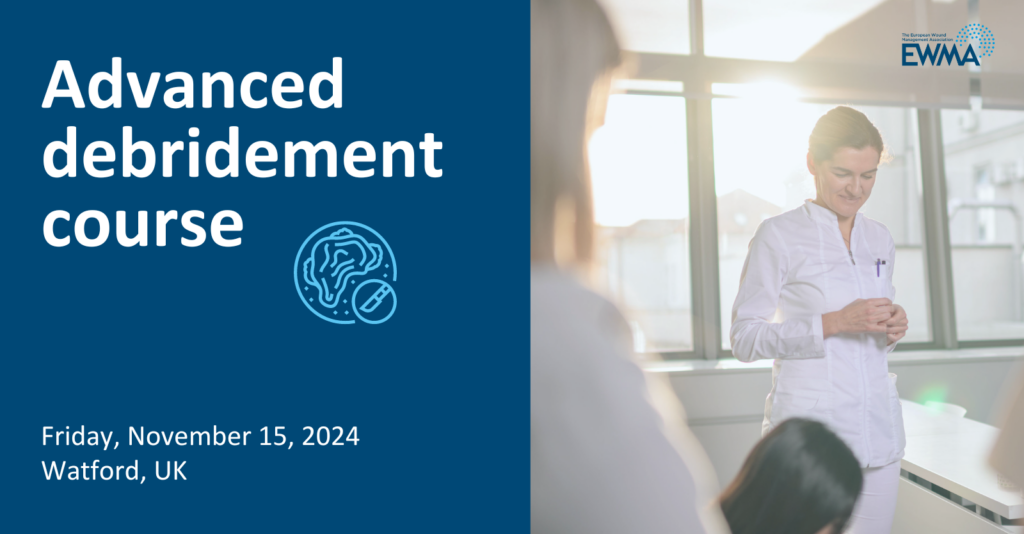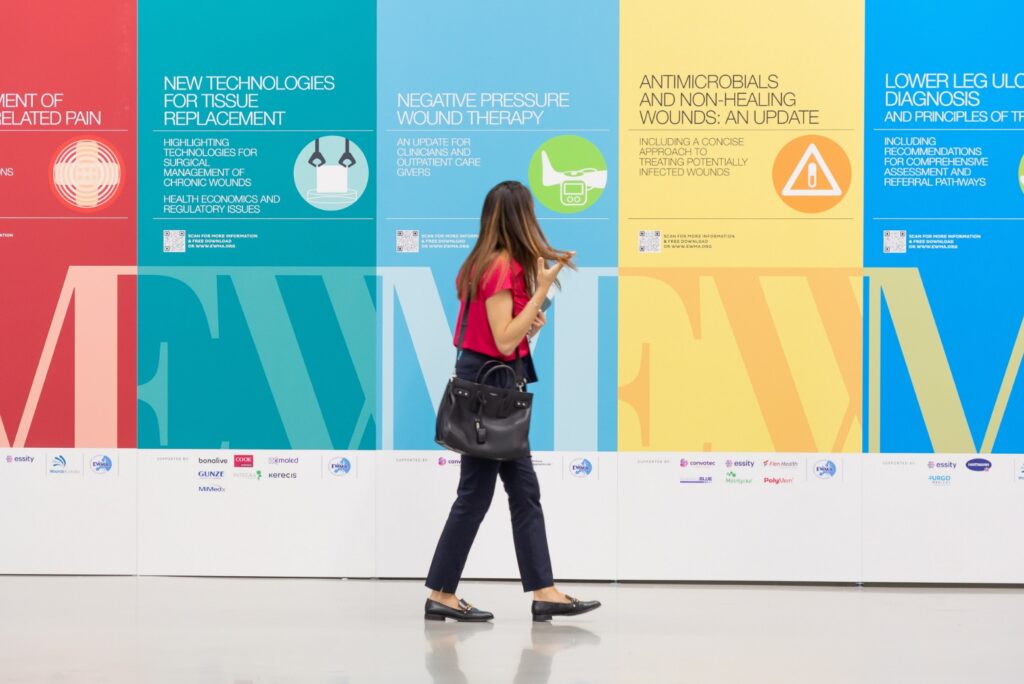
The EWMA Advanced Debridement course, Watford, United Kingdom 15/11/2024 – 15/11/2024 EWMA Advanced Debridement course, Watford, United Kingdom 15/11/2024 – 15/11/2024, has been accredited by the European Accreditation Council for Continuing Medical Education (EACCME®) with 6.5 6.5 European CME credits (ECMEC®s). Each medical specialist should claim only those hours of credit that he/she actually spent in the educational activity.
This postgraduate course is designed for nurses and physicians with at least two years of clinical practice in wound care. Ideal participants include those who are in their second year of residency, have substantial wound care experience, and see patients with wounds on a weekly basis. This course is also suitable for general practitioners involved in wound management.
The course aims to familiarize participants with surgical/sharp debridement. Through this course, participants will gain comprehensive knowledge about wound evaluation and the objectives of debridement, including when, how, and why to perform it. The workshop will cover the practical skills and the common pitfalls associated with debridement. Attendees will be able to practice sharp debridement techniques during the workshop, enhancing their ability to effectively integrate this essential practice into their wound care management.
Techniques will be demonstrated on cadavers, with participants practicing on pork belly simulation models for a hands-on learning experience
Prior to the course, we ask that you review the pre-reading materials and complete the pre-course test.
Key Takeaways/Learning Objectives:
Faculty:
Preliminary programme:
| Friday November 15 | Session title | Speaker | ||||
| 08.00 – 08.30 | Registration | EWMA Secretariat | ||||
| 08.30 – 08.50 | Introduction including information on health and safety | Ewa Stürmer and Sebastian Probst | ||||
| 08:50 – 09:20 | What is my technique on advanced debridement? – Discussion | Ewa Stürmer and Sebastian Probst | ||||
| 09.20 – 09.50 | Lecture on the role of education in developing practical Skills in debridement | Paulo Ramos | ||||
| 09.50 – 10.05 | COFFEE BREAK | |||||
| 10.05 – 10.20 | Lecture on indications and limitations of autolytic, chemical, enzymatic, and oxidative debridement | Ewa Stürmer | ||||
| 10.20 – 10.30 | Lecture on biofilm | Ewa Stürmer | ||||
| 10.30 – 10.45 | Lecture on indications and limitations of sharp debridement | Damien Pastor | ||||
| 10.45 – 11.00 | Lecture on indications and limitations of technical debridement | Damien Pastor | ||||
| 11.00 – 11.20 | Lecture on indications and limitations of surgical debridement | Ana Lamza | ||||
| 11.20 – 12.15 | LUNCH + CHANGING TIME | |||||
| 12.15 – 12.45 | Demonstration of sharp debridement | Ewa Stürmer | ||||
| Group 1 | Group 2 | Group 3 | Group 4 | Group 5 | Group 6 | |
| Workshop 1: Sharp debridement | Workshop + theory 2: Autolytic and enzymatic debridement | Workshop 3: Oxidative and chemical debridement | Workshop 4: Negative pressure wound therapy | Workshop 5: Surgical debridement | Workshop 6: Mechanical and hydrolytic debridement | |
| 12.50 – 13.20 | Demonstration of mechanical and hydrolytic debridement | Damien Pastor | ||||
| Group 2 | Group 3 | Group 4 | Group 5 | Group 6 | Group 1 | |
| Workshop 1: Sharp debridement | Workshop + theory 2: Autolytic and enzymatic debridement | Workshop 3: Oxidative and chemical debridement | Workshop 4: Negative pressure wound therapy | Workshop 5: Surgical debridement | Workshop 6: Mechanical and hydrolytic debridement | |
| 13.25 – 13.45 | Lecture on debridement techniques, limitations and strategies in children | Viviana Goncalves | ||||
| 13.50 – 14.20 | Demonstration of autolytic and enzymatic debridement | Paulo Ramos | ||||
| Group 3 | Group 4 | Group 5 | Group 6 | Group 1 | Group 2 | |
| Workshop 1: Sharp debridement | Workshop + theory 2: Autolytic and enzymatic debridement | Workshop 3: Oxidative and chemical debridement | Workshop 4: Negative pressure wound therapy | Workshop 5: Surgical debridement | Workshop 6: Mechanical and hydrolytic debridement | |
| 14.25 – 14.55 | Demonstration of surgical debridement | Ana Lamza | ||||
| Group 4 | Group 5 | Group 6 | Group 1 | Group 2 | Group 3 | |
| Workshop 1: Sharp debridement | Workshop + theory 2: Autolytic and enzymatic debridement | Workshop 3: Oxidative and chemical debridement | Workshop 4: Negative pressure wound therapy | Workshop 5: Surgical debridement | Workshop 6: Mechanical and hydrolytic debridement | |
| 14.55 – 15.15 | COFFEE BREAK | |||||
| 15.20 – 15.50 | Demonstration of oxidative and chemical debridement | Viviana Goncalves | ||||
| Group 5 | Group 6 | Group 1 | Group 2 | Group 3 | Group 4 | |
| Workshop 1: Sharp debridement | Workshop + theory 2: Autolytic and enzymatic debridement | Workshop 3: Oxidative and chemical debridement | Workshop 4: Negative pressure wound therapy | Workshop 5: Surgical debridement | Workshop 6: Mechanical and hydrolytic debridement | |
| 15.55 – 16.25 | Group 6 | Group 1 | Group 2 | Group 3 | Group 4 | Group 5 |
| Workshop 1: Sharp debridement | Workshop + theory 2: Autolytic and enzymatic debridement | Workshop 3: Oxidative and chemical debridement | Workshop 4: Negative pressure wound therapy | Workshop 5: Surgical debridement | Workshop 6: Mechanical and hydrolytic debridement | |
| 16.30 – 17.00 | Summary, evaluation and closing | Ewa Stürmer and Sebastian Probst | ||||
Programme is subject to change. Materials used in the skills lab or presented in introductions are sponsored by the industry partners supporting EWMA with unrestricted grants. For more information about our industry partners, please visit: https://ewma.org/about/sponsors/. The EWMA course organisers emphasize that a variety of products, including those used in the courses, as well as other products, are suitable to achieve successful results in debridement in wound care treatment and management.
Join more than 30,000 international colleagues!

European Wound Management Association
© All Rights Reserved 2025